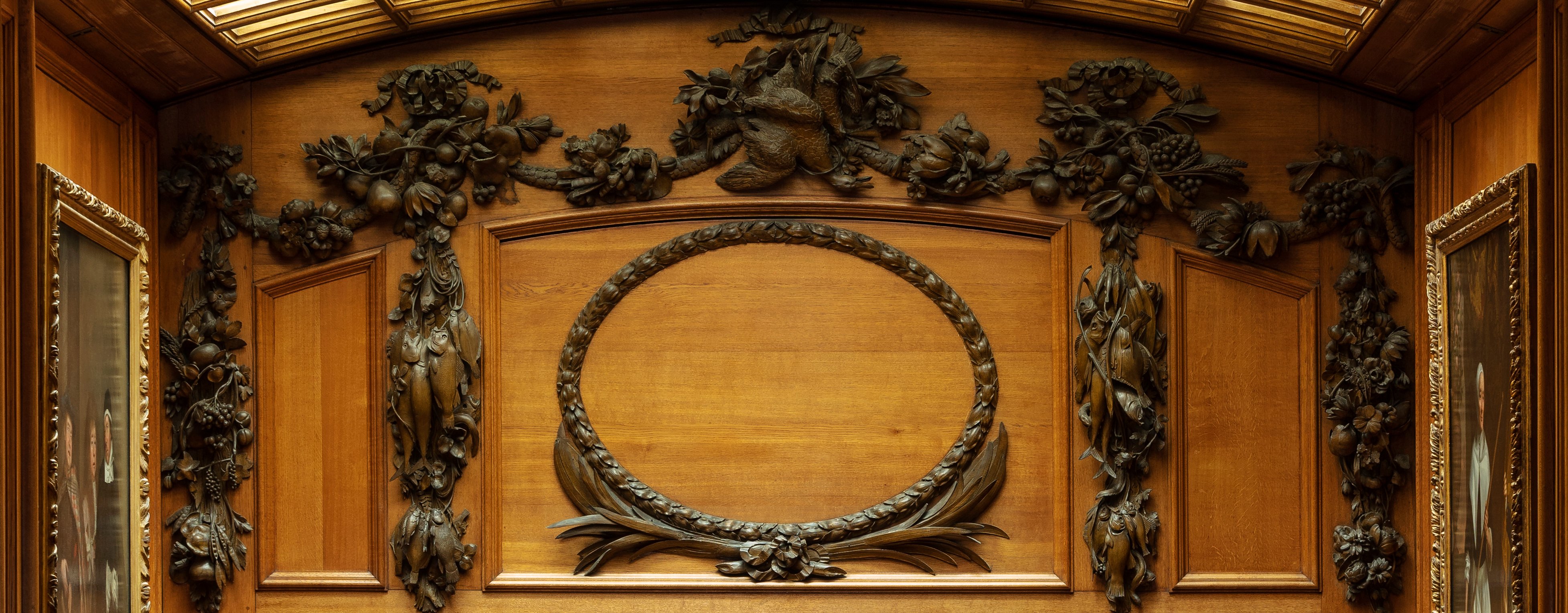
Grinling Gibbons
Royal Master Carver
PETER VANDREBANC (1649-97)
A statue of Charles II in Roman dress
c.1684-97Engraving | 72.4 x 51.0 cm (sheet of paper) | RCIN 602665
An engraving of a statue of Charles II as king: a full-length figure in Roman dress with a mantle, and with a baton in the right hand; standing on a pedestal with a Latin inscription and with the publisher's address below, 'London Printed and Sold by David Mortier at ye Sign of Erasmus's head in ye Strand.' Second state.
The Restoration brought with it the reintroduction of public sculptures, after statues of Charles I had been defaced or removed following his execution in 1649. This statue of Charles II as a Roman military commander was funded by the Merchant Adventurers of Hamburg at a cost of £500. Carved from Portland stone by Grinling Gibbons, it stood within the Royal Exchange. It was unveiled on 14 May 1684 and immediately garnered acclaim. Vandebranc's monumental portrait of Charles (RCIN 630472) may have recommended him as the printmaker selected to produce this image of the statue. This engraving was advertised on 12 January 1685 in the Observator: 'The exact draught of the marble statue of his Majesty in the Royall Exchange so long expected is now (by permission of authority) finished. Curiously engraven by Mr. Vandrebanc, and printed on a large sheet of imperiall paper. To be sold by Dorman Newman at the King's Arms in the Poultry. Price 2s 6d'. Gibbon's sculpture was destroyed in a fire of 1838, and this engraving provides the most accurate record of the work.
Text adapted from Charles II: Art & Power, London, 2017
The Restoration brought with it the reintroduction of public sculptures, after statues of Charles I had been defaced or removed following his execution in 1649. This statue of Charles II as a Roman military commander was funded by the Merchant Adventurers of Hamburg at a cost of £500. Carved from Portland stone by Grinling Gibbons, it stood within the Royal Exchange. It was unveiled on 14 May 1684 and immediately garnered acclaim. Vandebranc's monumental portrait of Charles (RCIN 630472) may have recommended him as the printmaker selected to produce this image of the statue. This engraving was advertised on 12 January 1685 in the Observator: 'The exact draught of the marble statue of his Majesty in the Royall Exchange so long expected is now (by permission of authority) finished. Curiously engraven by Mr. Vandrebanc, and printed on a large sheet of imperiall paper. To be sold by Dorman Newman at the King's Arms in the Poultry. Price 2s 6d'. Gibbon's sculpture was destroyed in a fire of 1838, and this engraving provides the most accurate record of the work.
Text adapted from Charles II: Art & Power, London, 2017







